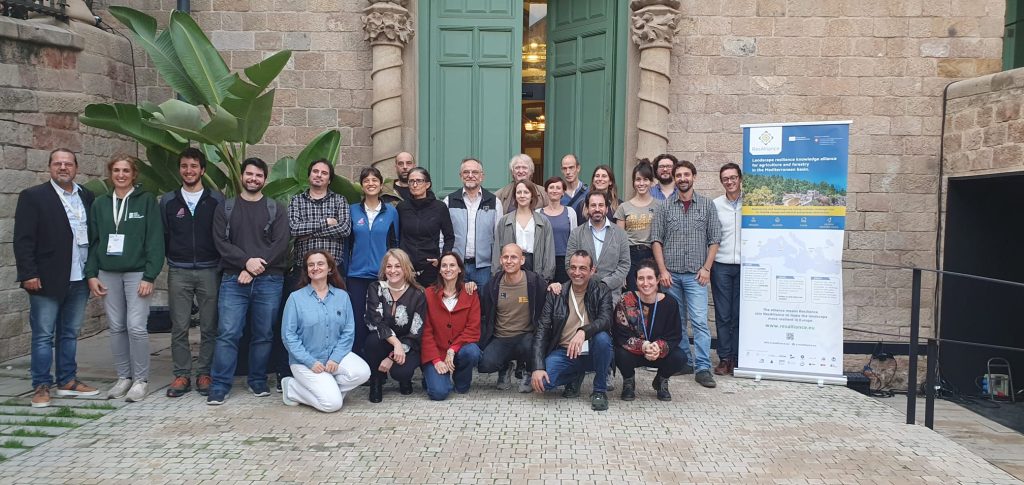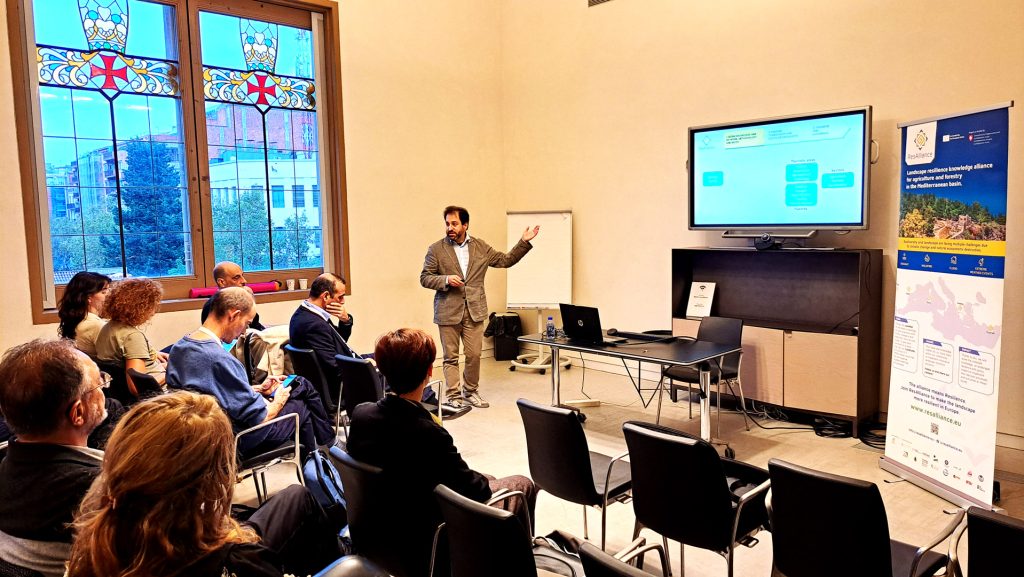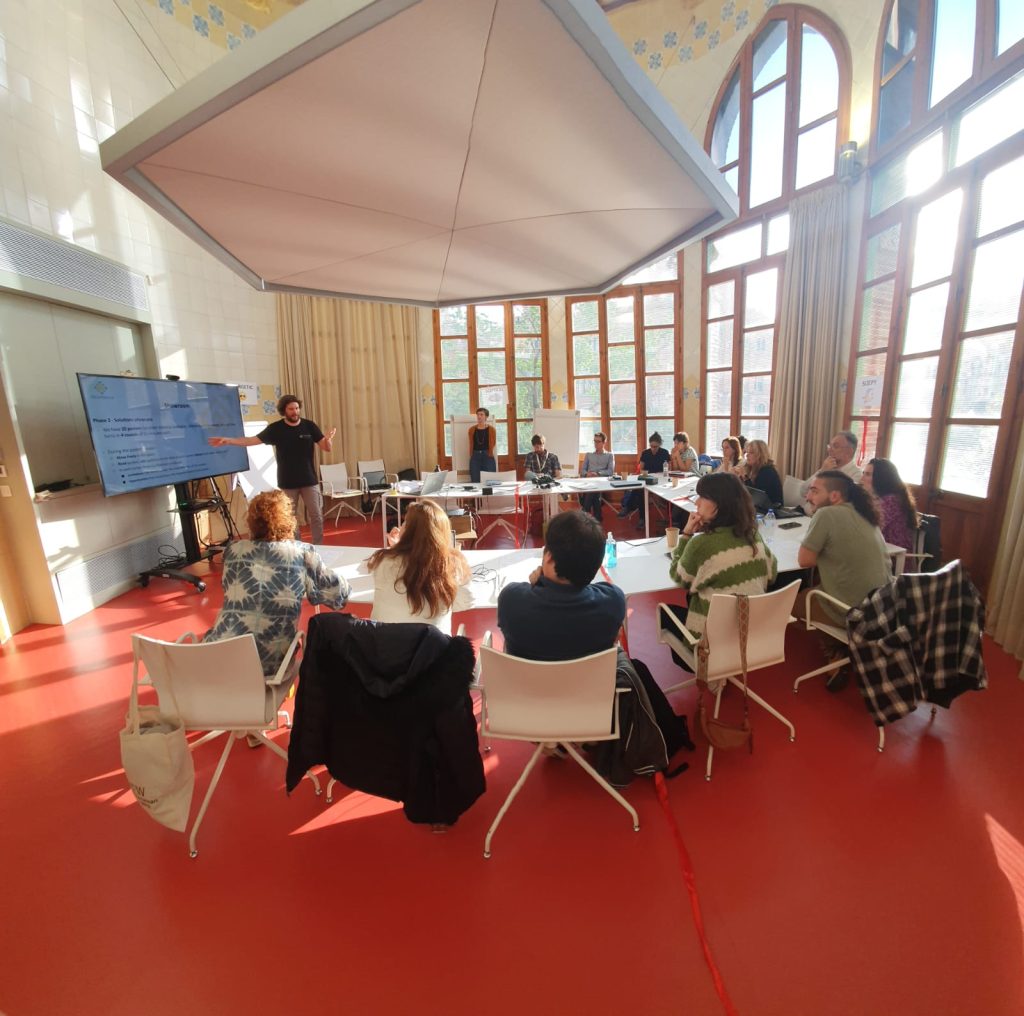We are pleased to share insights insights from the Catalonia LandLab, about ResAlliance’s participation in the 8th Mediterranean Forest Week, held in Barcelona from November 4 to 8, 2024.

Barcelona, 8 March 2024. ResAlliance – Catalonia Landlab, Spain
A multidisciplinary and international team of experts from the European project ResAlliance gathered at the 8th Mediterranean Forest Week (8 th MFW) to foster dialogue on ways to build and enhance landscape resilience to drought and severe wildfires. During the event, which took place from the 4 th to the 7 th of November in Barcelona, they led two activities to widen the network of stakeholders involved in the development and implementation of innovative solutions and science-based policies.
The context
The Mediterranean region is warming at a rate 20% faster than the global average. This exacerbates desertification, drought conditions and the risk of large wildfires, threatening biodiversity, food productivity, water availability and our safety. Building resilient landscapes is key to safeguarding the health of ecosystems and human well-being. ResAlliance aims to enhance landscape resilience in the Mediterranean through innovative research, collaboration and stakeholder engagement in the fields of agriculture and forestry.
The Info session
On the first day of the 8 th MFW, Eduard Mauri, expert at the European Forest Institute and coordinator of the ResAlliance project, and Valentina Romanin, local development project manager at Etifor, presented the work of ResAlliance at an info session organised by the Mediterranean Agronomic Institute of Chania, which is part of the CIHEAM network. The project concentrates its activity on five knowledge-exchange and transfer hubs called LandLabs, established in Portugal, Spain, Italy, Greece, and Cyprus. They are hosting participatory events that serve as meeting points for scientists, policymakers, practitioners, and local communities to discuss the challenges, needs and knowledge gaps in their regions, and exchange their solutions. Furthermore, the LandLabs are carrying out in-person work to identify innovative solutions to achieve landscape resilience that are already in practice. These are easily accessible to stakeholders as factsheets. So far, 121 factsheets have been published on the project’s website in English, and soon will also be available in Portuguese, Spanish, French, Italian and Greek. “The outputs ResAlliance is generating seek to support practitioners in enhancing the resilience of the landscape they manage”, states Mauri.

The policy forum
ResAlliance also aims to contribute to policy development and implementation. To this end,a policy forum was held on day two of the 8 th MFW, which was coordinated by the Centre for International Forestry Research. The core of this event consisted of a debate facilitated by Eduard Plana, senior researcher at the Forest Science and Technology Centre of Catalonia. The debate identified key barriers to building landscape resilience, including the lack of adaptive and long-term legislation. The opinions expressed by the participants will be part of a White paper on policy recommendations for landscape resilience in the Mediterranean region. After the 8 th MFW, ResAlliance enters its last year, full of opportunities to contribute to and benefit from all the knowledge being gathered on enhancing landscape resilience. For example, in-person events such a showrooms of good practices, field visits, exhibitions, other policy forums, etc., and access to useful resources through LandNet. LandNet is a free-access network connecting stakeholders from multiple Mediterranean countries to exchange knowledge, share data and collaborate on landscape resilience initiatives. LandNet members have access to the ‘ResAlliance forum’, launched on the 4 th of November, to discuss good practices on landscape resilience, and a MOOC starting next February. They also receive notifications on events happening nearby. Finally, the ResAlliance project will continue promoting good practices. “We wish that practitioners consult, adopt and implement good practices from the 121 best ones
we have collected. Although we have finished collecting these, we invite anyone leading a good practice on landscape resilience in the Mediterranean to share it with us to reach other practitioners in the Mediterranean”, adds Eduard Mauri.

More information
- To join the LandNet: https://www.resalliance.eu/join/
- To share good practices on landscape resilience:
https://www.resalliance.eu/introducing-your-innovative-landscape-resilience-practice/
Contact
Local reference
Lucía de la Riva, Pau Costa Foundation: ldelariva@paucostafoundation.org
Project reference
Matteo Gabaglio, Etifor: matteo.gabaglio@etifor.com